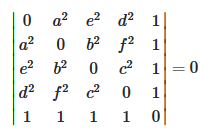我有一个看起来像这样的 5x5 矩阵(具体来说,它是嵌入到平面中的 4 点形状的边长 Cayley-Menger 矩阵):
如果所有其他值已知,我正在尝试求解使矩阵奇异的值(因此行列式等于零),即:
a: 2.357086
b: 2.017018
c: 2.681643
d: <unknown>
e: 2.900140
f: 3.261168
在上面的例子中,我只是出于演示目的而省略了 d(不过,如果要求解矩阵,答案将是 1.597908)。可能会缺少 a、b、c、d、e 或 f,但只有一个,而且永远只有一个。
我如何以相当通用的方式在代码中解决这个问题?最终,我希望创建一个函数,在其中可以传入 5 个必需变量和一个索引参数,该索引参数确定要求解的未知数,然后返回所有可能的答案(可能是 0、1 或 2 个可能的答案) - 像这样的东西:
vector2 SolveForMissingSide(float sides[], int index)
{
// Do something here, return 0, 1, or 2 answers
}
float sides[] = {2.357086, 2.017018, 2.681643, 0, 2.900140, 3.261168};
// ^
// 4th side set to zero here because it's unknown
// Call the solver to solve for the 4th unknown side, or "d" in this case
vector2 missingSides = SolveForMissingSides(sides, 4);
printf("The length of side d is either: %f or %f\n", missingSides[0], missingSides[1]);
不幸的是,我在这里无法访问 Eigen 或 numpy 之类的东西,因为我正在尝试为嵌入式设备编写一个函数,该函数对类似 C 的设施的访问相当有限(常见的数学函数,如 sqrt、sin/cos/tan 等都可用)。
最佳答案
以下答案一般来说不太相关, 但由于提出了一个具有挑战性的问题,所以就这样了。
我首先在 Mathematica 中计算行列式:
det = {{0, a^2, e^2, d^2, 1},{a^2, 0, b^2, f^2,1}, {e^2, b^2, 0, c^2, 1}, {d^2, f^2, c^2, 0, 1}, {1, 1, 1, 1, 0}} //Det
经过一些操作,C代码生成并使用
a2 = a^2, b2 = b^2, .... 行列式简化为:
det = -2*(a2*a2*c2 - a2*b2*c2 - a2*b2*d2 + a2*b2*e2 + a2*c2*c2 - a2*c2*d2 - a2*c2*e2 - a2*c2*f2 +
a2*d2*f2 - a2*e2*f2 + b2*b2*d2 - b2*c2*d2 + b2*c2*f2 + b2*d2*d2 - b2*d2*e2 - b2*d2*f2 -
b2*e2*f2 + c2*d2*e2 - c2*e2*f2 - d2*e2*f2 + e2*e2*f2 + e2*f2*f2)
由于我们需要求解方程 det = 0,因此我们忽略
-2 乘法因子,剩下的是
22 个项由 +1 或 -1 因子组成,并且
六个变量中的三个相乘 a2, b2, ...。
这些术语可能存在逻辑,因此可以以智能方式生成它们,例如与变量排列的签名相关的东西。不过,我并没有花费太多精力去寻找这种逻辑,而是只是从 Mathematica 中对它们进行了硬编码。
因此,这些项被实现为数组 int terms[22][4],每个项对应的四个整数是:首先是 +1 或 -1系数,然后是变量的三个索引
按照a2->0、b2->1、...f2->5的顺序。
由于我们知道六个变量中的五个a2, b2, ..., f2,
很容易找到二阶的三个系数
det = 0 的等式。
这是实现 - 抱歉使用了 double 而不是 float 以及不同的函数签名(但是,有四种可能的解决方案,我不知道哪一种选择一项),
但我确信OP可以适应它:
#include <stdio.h>
#include <math.h>
const int terms[22][4] = {
{+1, 0, 0, 2}, //+a2*a2*c2
{-1, 0, 1, 2}, //-a2*b2*c2
{-1, 0, 1, 3}, //-a2*b2*d2
{+1, 0, 1, 4}, //+a2*b2*e2
{+1, 0, 2, 2}, //+a2*c2*c2
{-1, 0, 2, 3}, //-a2*c2*d2
{-1, 0, 2, 4}, //-a2*c2*e2
{-1, 0, 2, 5}, //-a2*c2*f2
{+1, 0, 3, 5}, //+a2*d2*f2
{-1, 0, 4, 5}, //-a2*e2*f2
{+1, 1, 1, 3}, //+b2*b2*d2
{-1, 1, 2, 3}, //-b2*c2*d2
{+1, 1, 2, 5}, //+b2*c2*f2
{+1, 1, 3, 3}, //+b2*d2*d2
{-1, 1, 3, 4}, //-b2*d2*e2
{-1, 1, 3, 5}, //-b2*d2*f2
{-1, 1, 4, 5}, //-b2*e2*f2
{+1, 2, 3, 4}, //+c2*d2*e2
{-1, 2, 4, 5}, //-c2*e2*f2
{-1, 3, 4, 5}, //-d2*e2*f2
{+1, 4, 4, 5}, //+e2*e2*f2
{+1, 4, 5, 5}, //+e2*f2*f2
};
void solveDet(int unknownIdx, double knownValues[5], int *nSolutions, double solutions[4]){
// all known vales squared, and 1 for the unknown variable
double allSqrValues[6];
for(int i = 0; i < 6; i++){
allSqrValues[i] = i < unknownIdx ? knownValues[i] :
i == unknownIdx ? 1 : knownValues[i-1];
allSqrValues[i] *= allSqrValues[i];
}
double a = 0, b = 0, c = 0; // coeffs of second degree equation
for(int iTerm = 0; iTerm < 22; iTerm++){
const int* term = terms[iTerm];
double term_value = term[0] * allSqrValues[term[1]] *
allSqrValues[term[2]] * allSqrValues[term[3]];
// the number of occurrences of the unknown variable in the term
int nOccurrences = (term[1] == unknownIdx) +
(term[2] == unknownIdx) + (term[3] == unknownIdx);
if(nOccurrences == 2){ //x^2
a += term_value;
}
else if(nOccurrences == 1){ //x^1
b += term_value;
}
else{ //x^0 - no x
c += term_value;
}
}
// The solution of the 2nd degree equation
double sqrtDelta = sqrt(b*b - 4*a*c),
x1 = (-b - sqrtDelta)/2/a,
x2 = (-b + sqrtDelta)/2/a;
// return ± the square root of the positive solutions - 0, 2, or 4 solutions
*nSolutions = 0;
if(x1 >= 0){
solutions[(*nSolutions)++] = -sqrt(x1);
solutions[(*nSolutions)++] = sqrt(x1);
}
if(x2 >= 0){
solutions[(*nSolutions)++] = -sqrt(x2);
solutions[(*nSolutions)++] = sqrt(x2);
}
// // verify det = 0
// allSqrValues[unknownIdx] = x2;
// double det = 0;
// for(int iTerm = 0; iTerm < 22; iTerm++){
// const int *term = terms[iTerm];
// //printf("%2d %d %d %d\n", term[0], term[1], term[2], term[3]);
// det += term[0] * allSqrValues[term[1]] *
// allSqrValues[term[2]] * allSqrValues[term[3]];
// }
// printf("det=%g\n", det);
};
int main(){
//a: 2.357086
//b: 2.017018
//c: 2.681643
//d: <unknown>
//e: 2.900140
//f: 3.261168
double knownValues[5] = {2.357086, 2.017018,
2.681643, 2.900140, 3.261168};
int unknownIndex = 3;
int nSolutions;
double solutions[4];
solveDet(unknownIndex, knownValues, &nSolutions, solutions);
if(nSolutions == 0){
printf("No solutions\n");
}
else{
printf("Solutions: ");
for(int iSol = 0; iSol < nSolutions; iSol++){
printf("%g ", solutions[iSol]);
}
printf("\n");
}
return 0;
}
关于c - 求解使 5x5 对称矩阵奇异所需的值,我们在Stack Overflow上找到一个类似的问题: https://stackoverflow.com/questions/75867705/
